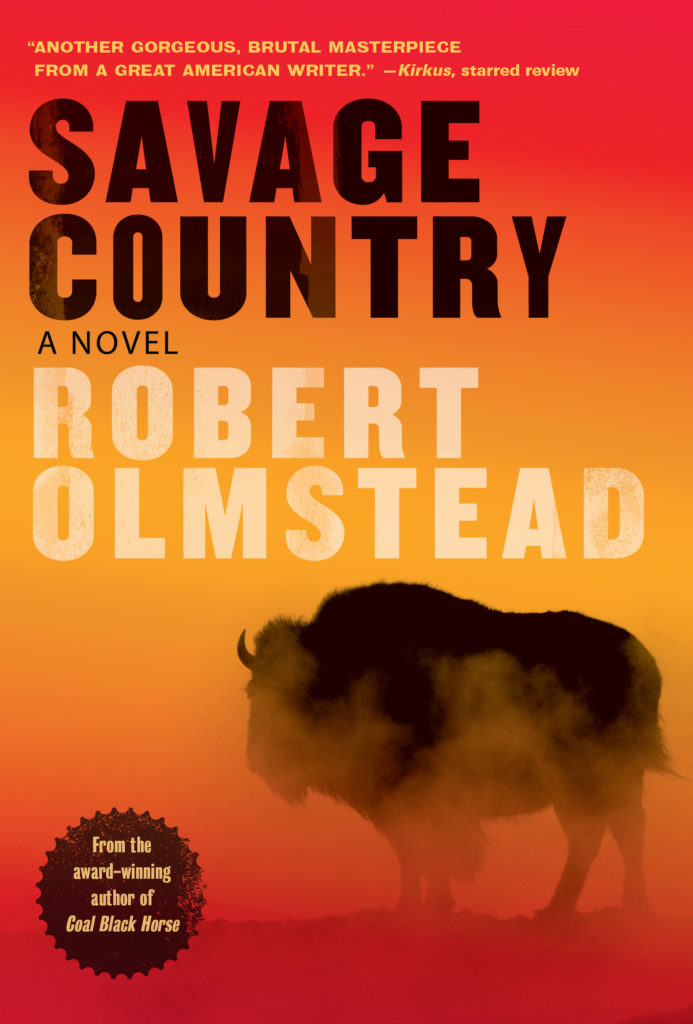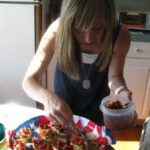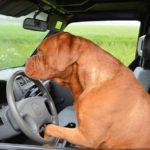Welcome to our #FridayReads feature on the blog, where we’ll be excerpting a chapter of one of our favorite books to start your weekend. This week, it’s Robert Olmstead’s Savage Country, a gripping narrative of an infamous hunt, which drove the buffalo population to near extinction—the story of a moment in our history in which mass destruction of an animal population was seen as the only route to economic solvency.
Scroll down for an excerpt.

Savage Country
Some distance from town he was met with the smell of raw sewage and creosote, the stink of lye and kerosene oil, the carrion of dead and slaughtered animals unfit for human consumption. He struck the mapped, vacant streets where there was a world of abandoned construction, plank shacks with dirt floors and flat-pitched roofs hedged with brambles and waste. Two cur dogs snarled at each other over a bone. Dead locust strewed the ground three inches deep.
The year was 1873 and all about was the evidence of boom and bust, shattered dreams, foolish ambition, depredation, shame, greed, and cruelty. Notes were being called in for pennies on the dollar. Money was scarce and whole families were pauperized.
For weeks countless swarms of locusts, brown-black and brick-yellow, darkened the air like ash from a great conflagration, their jaws biting all things for what could be eaten. They fed on the wheat and corn, the lint of seasoned fence planks, dry leaves, paper, cotton, the wool on the backs of sheep. Their crushed bodies slicked the rails and stopped the trains.
Michael rode light in the saddle, his left hand steady on the reins. His trousers were tucked inside the shafts of his stovepipe boots, and the buckhorn haft of a long knife protruding above the top was decorated with plates of silver. His black hair was long and plaited into a queue, which hung down his back. A shotgun was cradled in his free arm and on the saddle before him sat a setter dog and behind his right leg hung a string of game birds. The red dog had fallen out a mile ago and he thought that was perhaps for the best.
Farther on was a ravine of tents and dugouts where gambling, drinking, dog fights, and cockfights were taking place. Dingy flaps of canvas were flung back and barefoot women swept their dirt floors into the road. From a tent advertising Turkish baths came the bleating sound of a hurdy-gurdy. Men lay sleeping on the ground undisturbed, a paste of dirt and saliva on their bruised faces.
Ahead was the darker line marking the railroad grade and the looming warehouses lining the tracks, the bone pickers and hair scavengers converging and departing from across the open land. Along the right-of-way was a rick of bones twelve feet high, segmented in the shape of boxcars, and a half mile long. This was the last of the Kansas buffalo.
Soon he could hear the hammering and banging of the blacksmith. There was a fine dust in the air that remained suspended. An eastbound train chuffed to a stop to take on bones, water, and the broke families bankrupted by the plague of locust.
A portly man in fawn-colored trousers and a black overcoat came off the platform in a hurry. He stepped into a two-horse fringed-top surrey parked at one end. The man reached for the whip and gave the team a smart cut across the flanks. The drays stepped out and in tandem, their broken tails lifting in cadence.
At the post office Michael asked after mail for himself or anyone at Meadowlark. There was a letter for him from Mr. Salt.
“Michael Coughlin,” the postmaster read, handing him the envelope.
“This letter has been opened,” he said.
“It must not have been adequately sealed,” the postmaster said.
He handed the postmaster the sealed envelope he carried. He paid the postage to London and inquired when the mail would be sent. The stamp affixed, he took back the envelope.
“I will be happy to take care of that for you,” the postmaster said, his hand out.
“You can take care of this one,” he said, handing him another.
“You can do that?” he said.
“Yessir,” the postmaster said.
There was a plaza in town and a collection of shops on the four sides of it: saddler, watchmaker, gunsmith, mercantile, hotel, barroom, two druggists. Michael stopped at each one, explaining that his brother, David Coughlin, had passed and Michael would settle outstanding balances. From the druggists he purchased their supply of quinine and asked that they order more and make delivery to Meadowlark. The first had nothing to say, but the second one did.
“Malaria?” the druggist said.
“I was very ill for several weeks,” Michael said, switching his shotgun from the cradle of one elbow to the other.
“It will be here tomorrow. Your brother, he was a never-give-up man. He will be missed.”
Stalls were erected in the plaza and men and women were raising money to leave by selling what little they owned to immigrants newly arrived. From one, a tatterdemalion boy was selling honey and beeswax candles. Michael paid for a mixture of nuts, candies, figs, and four oranges. He stood about, drinking gently a cored orange.
The postmaster stepped out and went down the street where he entered another building that represented itself as the Kansas Land Office. Young boys of a hard nature loitered in front, posing and strutting. They wore shiny revolvers and knives. Their neckerchiefs were as if brilliant plumage. The black runner and a big raw-boned sorrel were hitched at the rail.
“Mister,” the tatterdemalion boy said, offering him an envelope of gold stars to put in the night sky. He’d cut them with scissors out of tissue paper. Michael paid for the stars as the postmaster was setting off again in the direction of the church steeple, carrying Elizabeth’s letter in his hand.
Beneath a tarpaulin roof an old man with a brick-red face and deep-set eyes was selling bread drenched in sweet molasses, wolf pelts, and broken pinchbeck timepieces he displayed on a three-legged stool. The old man had a walleye and his cheeks were deeply pitted by smallpox. He carried the heavy scar of an edged weapon. The stroke was vertical and cut through his forehead, his nose, lips, and chin. The halves of his face were sewn together in a ridged seam, stitch holes scarring both sides. He wore a fur hat decorated with two stuffed blue jays. He smoked a pipe with a red clay-stone bowl and a cane-joint shank and labored with each weary breath.
From somewhere off came the slurred harmonizing of men singing. A strange languor settled in the space between Michael and the old man as they watched two little girls play marbles in the dust.
“What happened to yo’r pony?” the old man said, asking after the scars on Khyber’s flanks.
“A lion,” Michael said.
“A big big lion,” the old man said, inclining his head as if to hear better.
“Big enough,” Michael said. “Nine feet seven inches from tooth to tail and near four hundred pounds.”
“Where are you from,” the old man said, “they have such lions?”
“I am from away,” Michael said.
The old man told him his name was Bonaire and he was a wolfer and he was also from away. His mother was Lakota and his father French. He fished inside his shirt for the medallion he wore around his neck, Agnus Dei, the lamb of God.
“What is it you are wanting?” the old man said, letting the medallion drop. “A woman or a drink?”
“I do not want neither nor.”
“What man from away does not want neither nor?”
The old man dragged off his fur hat and rubbed at his forehead. He had no ears. The auricles had been cut away, and left were the receptacles of his ear holes. He then slyly lifted a cloth and invited Michael to look. Beneath was a collection of six skulls he said were Kiowa.
“Make me an offer,” he said, but Michael declined.
At a street corner a man in a derby hat let down the leg in his barrel organ. His companion, a capuchin monkey with cup in hand, bounced from his shoulder to the organ to the street. The man had fixed mechanized birds to the top, and when he played, the birds bobbed their heads and flared their tail feathers. The little girls gathered their marbles and ran in his direction.
Michael asked after Whitechurch, the man he was looking for.
“He would be one of the evil kings of the earth,” the old man said.
“Be that as it may, I have business with him.”
“He’d eat his own gut for money,” the old man said.
“It takes all sorts to make a world,” Michael said.
The old man took the bowl of his pipe in his right hand and pointed with the stem at the Kansas Land Office.
Hooked? You can buy the book here.
Amazon | B&N | Indiebound | Workman





No Comments